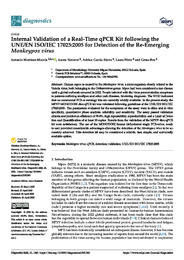Título :
Internal Validation of a Real-Time qPCR Kit following the UNE/EN ISO/IEC 17025:2005 for Detection of the Re-Emerging Monkeypox virus |
Autor :
Martínez-Murcia, Antonio
Navarro, Aaron
García-Sirera, A.
Pérez, Laura
Bru, G. |
Editor :
MDPI |
Departamento:
Departamentos de la UMH::Producción Vegetal y Microbiología |
Fecha de publicación:
2023-04-26 |
URI :
https://hdl.handle.net/11000/35094 |
Resumen :
Human mpox is caused by the Monkeypox virus, a microorganism closely related to the Variola virus, both belonging to the Orthopoxvirus genus. Mpox had been considered a rare disease until a global outbreak occurred in 2022. People infected with the virus present similar symptoms to patients suffering smallpox and other rash illnesses, hindering diagnosis. The WHO indicated that no commercial PCR or serology kits are currently widely available. In the present study, the MPXV MONODOSE dtec-qPCR kit was validated following guidelines of the UNE/EN ISO/IEC 17025:2005. The parameters evaluated for the acceptance of the assay were in silico and in vitro specificity, quantitative phase analysis, reliability, and sensitivity. The assay passed validation criteria and yielded an efficiency of 95.8%, high repeatability, reproducibility, and a Limit of Detection and Quantification of at least 10 copies. Results from the validation of the MPXV dtec-qPCR kit were satisfactory. The use of the MONODOSE format (dehydrated single PCR-tubes, ready to use) provided considerable advantages allowing the detection of the Monkeypox virus to be accurately achieved. This detection kit may be considered a reliable, fast, simple, and universally available option
|
Palabras clave/Materias:
Monkeypox virus
qPCR
Detection
Validation
UNE/EN ISO/IEC 17025:2005 |
Tipo de documento :
info:eu-repo/semantics/article |
Derechos de acceso:
info:eu-repo/semantics/openAccess
Attribution-NonCommercial-NoDerivatives 4.0 Internacional |
DOI :
https://doi.org/10.3390/diagnostics13091560 |
Publicado en:
Diagnostics 2023, 13(9), 1560 |
Aparece en las colecciones:
Artículos - Producción vegetal y microbiología
|
 La licencia se describe como: Atribución-NonComercial-NoDerivada 4.0 Internacional.
La licencia se describe como: Atribución-NonComercial-NoDerivada 4.0 Internacional.
.png)
